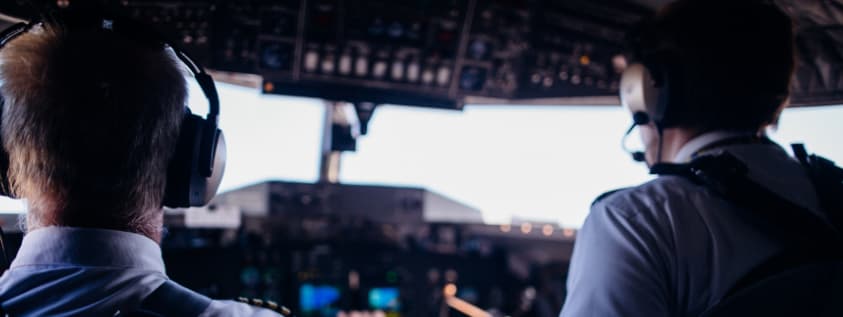Monitoring is one of the most unknown tasks of a pilot. Beyond the control of the aircraft, the pilot is also in charge of supervising that everything is working properly in order to prevent risks during the flight.
Monitoring is a word that encompasses many of the pilot’s competencies. It consists of watching, observing, tracking and checking all aspects of the flight, from the engine and cockpit equipment to the crew.
To perform this task requires extensive knowledge of the aircraft, observation skills and a high attention span.
How to monitor
Monitoring requires several skills that a pilot must have several skills such as:
- Attention management: This skill consists of being able to focus attention to a site for a given period of time.
- Deliberate checking: This is the active action of looking for something rather than looking at it. The difference between searching and looking implies a basic understanding of what is being checked.
- Cross-checking: Cross-checking consists of confirming information through separate sources to ensure objectivity in confirmation.
In addition to these three broad areas, we also find more specific skills that will tell us if we are skilled at monitoring a flight. Some of the skills that show that a pilot has a good monitoring ability are:
- Be able to follow standard operating procedures consistently.
- Being able to remain vigilant.
- Always be on the lookout for more clues. In this case, the skill sought is to be able to realize when the data provided by the flight systems do not match.
- Intervene if aircraft actions do not match expected actions.
- Constantly compare power and pitch setting information with flight path performance.
- Be able to assign priority to flight segments that are most vulnerable to revision errors.
Qué monitorizar
In addition to knowing how to monitor, it is important to know what a pilot should monitor. This task should be cross-cutting and apply to various parts and tasks of the aircraft. A pilot, for example, will be able to monitor:
- Flight path: One of the factors to be monitored by the pilot is the tracking of the aircraft’s trajectory and status: energy status, power settings and automated systems.
- Systems: This involves observing and monitoring the ship’s systems such as, for example, pressurization, hydraulics, etc…
- Crew: Another factor that a professional pilot must take into account is the supervision of the actions and condition of the co-pilot and the situation of the crew.

Being a very broad term, it is not a task that is performed, but a constant act of work and must be performed simultaneously with other tasks such as communication with the ATC or piloting the aircraft.
Good practices
Good monitoring is based on effective task management. Task scheduling and task distribution is paramount to focus efforts and be efficient. In addition, there are other practices that promote good monitoring performance, as stated in the Monitoring Matters how-to manual:
- Knowledge: Familiarity with the operation of the electronic equipment, with the layout of the elements, system responses and maneuvers facilitates the task. To be able to judge the correct operation of an aircraft you must be familiar with it.
- Skills: Judgmental and control skills are vital to perform the task. Control skills include several factors such as the ability to recognize and respond to any deviation, the ability to alert on changes, recognize and assess abnormal conditions, among many others.
- Experience: As with knowledge, experience also makes it easier. The more familiar you are with operating procedures and systems, the easier it is to recognize abnormal patterns. In addition to the knowledge gained from experience, experience also brings the ability to perform operational tasks, requiring less concentration, which can be devoted to monitoring.
- Attitude: A good pilot is always a bit skeptical of systems and will, for example, cross-check the autopilot operation. The key to good monitoring is judgment.
- Communication: Apart from knowing how to detect problems, a good pilot must also know how to communicate them. Monitoring is useless if there is no efficient communication between pilots and crew.
As you can see, being a good pilot goes far beyond the skills of piloting an aircraft. To be a professional you must have a deep knowledge of the aircraft and its systems. At EAS we train you to be able to perform an integral management of a flight and become a real airplane pilot.
